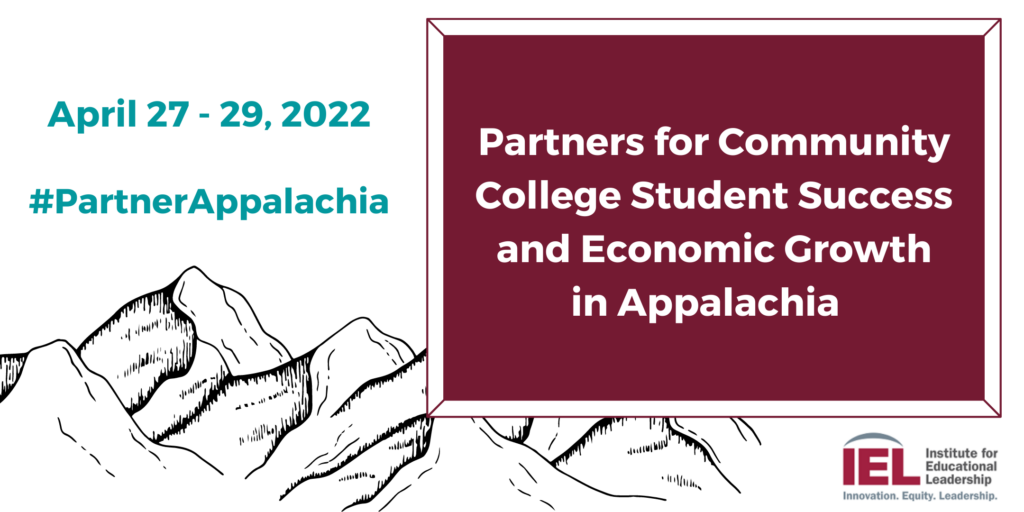The Institute for Educational Leadership (IEL) hosted a 3-day virtual convening, Partners for Community College Student Success and Economic Growth in Appalachia, designed to bring together experts and learners from across Appalachia to lift up partnerships that grow enrollment, increase student success, and provide a workforce that promotes economic development and regional prosperity. Participants heard from regional leaders, college administrators, community partners, and community college students, as well as had an opportunity to work across geographies on a planning tool to identify actions that could be further advanced through partnerships. The convening built upon alignment of IEL’s long-standing work supporting post-secondary leaders within Appalachia, systems leaders in the workforce development, vocational and rehabilitation services, and disability inclusion through the Center for Workforce Development, and education leaders through the 58-year-old Education Policy Fellowship Program.
Dr. Anthony Carnevale, Director and Research Professor at the Georgetown University Center on Education and the Workforce, opened the event focusing on trends and analysis of education and workforce data and their implications for the future of higher education and employment. Carnevale noted that “Postsecondary education has become the most well-traveled pathway to economic success,” as two-thirds of jobs require some post-secondary training. Three community and regional college presidents–Dr. Kevin Boys, Southern State Community College; Dr. John Gossett, AB Tech Community College; and Susan Snelick, Northern Pennsylvania Regional College–addressed the imperative of collaborative partnership.
Dr. Sharon Morrisey, the Senior Vice Chancellor for Academic Services and Research for the Virginia Community College System, stressed the importance of supporting all community college learners and making sure that all students have access to learning opportunities they need. Dr. Yolanda Watson Spiva, President of Complete College America, underscored that instead of making students college-ready we need to make our colleges student-ready in order to serve as an “engine of equity, prosperity, and hope.” Community college panelists Phetoudone Pat Nivanh, Sophia Fink, Stacy Propst, Estela Jones, and Elizabeth Jarrett emphasized the importance of having cultural representation on campus and student supports that reduce barriers, such as language services, financial aid, childcare, disability accommodations, and inclusion. Student panelists shared their lived experiences and encouraged higher education to focus on building inclusive campuses.
The event concluded with a discussion about keys to sustaining partnerships. Lee Davis, Workforce Coordinator, Center for Workforce and Innovation of Appalachia – Mountain Empire State CC; Alan Gullett, Division Director, Carl D. Perkins Vocational Training Center; Al Moore, Dean of Workforce Solutions and Economic Development, Bevill State Community College (AL); and Tiffany Ramsey, East Tennessee Area Director, State of Tennessee, DHS- Vocational Rehabilitation, spoke about the importance of open communication, building trust, and fostering relationships. In the words of Candace Williams, the Executive Director of Rural Community Alliance, “If they build it, they will defend it.”
Participants left the three-day convening of panel sessions, work groups, and networking events, energized by new partnerships and with a gameplan to further inclusive campuses in their communities. At the conclusion of the convening, participants appreciated the opportunity to get feedback on their own work around partner outreach, student engagement, and building sustainable relationships. We can’t wait to see what great partnerships are formed to support students in Appalachia!
We thank the IEL staff for creating space for regional system building, ideation, and peer learning: Dr. Monica Carpenter, Dr. Helen Malone, Dahlia Shaewitz, Dr. Emily Cheng, Rita Musello-Kelliher, Mia Perry, and Gaby Manriquez-Eschbach.
A special thanks to Ascendium Education Group for their support of this convening and to Kirstin Yeado, Program Officer in Ascendium’s Support Rural Postsecondary Education and Workforce Training grantmaking focus area.
